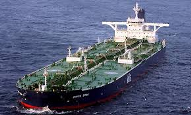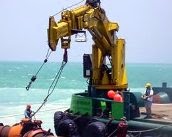Canada’s federal government isn’t doing enough to build support for Enbridge Inc.’s proposed pipeline to ship crude from the oil sands to the nation’s Pacific coast, said Alberta Finance Minister Doug Horner.
“The federal government needs to step up here a little bit” to convince aboriginal groups and the general public that the Northern Gateway pipeline is in the nation’s interest, Horner said in an interview at Bloomberg headquarters in New York. “We’ve suggested to them that they may want to get involved.”
Opposition by aboriginal groups and environmentalists is clouding Canada’s plans to develop Alberta’s oil sands, home to the world’s third-largest recoverable crude reserves. Producers such as Royal Dutch Shell Plc and Total SA are counting on projects such as Northern Gateway and TransCanada Corp.’s Keystone XL to ease a transportation bottleneck that has suppressed the price of Canada’s heavy crude, costing the economy C$50 million ($46 million) a day, according to the Canadian Chamber of Commerce.
The federal government should make it clear the pipeline is of national economic importance, said Horner. “You have to remember that a lot of what we do in western Canada creates economic activity and jobs in eastern Canada,” he said.
Harper’s government must decide whether to approve Northern Gateway by June. A regulatory panel said in December the project could move ahead under certain conditions.
British Columbia, the country’s westernmost province, has said it will only back the project if it meets five conditions, including greater engagement with aboriginals and increased financial benefits for the province. Local communities say there’s too much risk and too little benefit to having an oil pipeline cross their region.
Canadian Finance Minister Joe Oliver, who was the country’s natural resources minister until last month, told reporters today the government is constrained in what it can say until the cabinet issues its decision.
Horner’s comments followed a speech by former Canadian prime minister Brian Mulroney in which he called for a “strong national commitment” to export the nation’s natural resources to markets around the world, in particular Asia.
“We cannot sit back, contemplating our collective navel and expect customers to knock on our door,” Mulroney said yesterday. “We have to demonstrate convincingly that we are capable of doing what is required to earn their confidence that we are a reliable, efficient source of supply.”
Horner said he’s “cautiously optimistic” the U.S. will approve TransCanada Corp.’s Keystone XL pipeline, which would link the oil sands to refineries along the Gulf Coast.
President Barack Obama’s administration is reviewing the route, which was first proposed in 2008.
“We are not just focused on Keystone,” Horner said. “We are looking at all three of the opportunities that are there today -- that’s east coast, west coast and to the south.”
Horner also said he is “seriously considering” running to succeed Alison Redford as leader of Alberta’s ruling Progressive Conservative Party. Redford stepped down last month amid questions about her expenses and leadership.
Horner is also speaking today to the Canadian Association of New York.
Providing useful resources, articles and writings on crude oil, other petroleum products, energy and gas. By Blockline and Associate Ltd Nigeria Ltd, online.

 Nigeria Bonny Light Crude Oil (BLCO, FLCO and ALCO, etc): We sell mostly on FOB, CIF, TTO and TTT/STS Basis.
Nigeria Bonny Light Crude Oil (BLCO, FLCO and ALCO, etc): We sell mostly on FOB, CIF, TTO and TTT/STS Basis. We sell and lease tug-boats of all kinds.
We sell and lease tug-boats of all kinds.

No comments :
Post a Comment